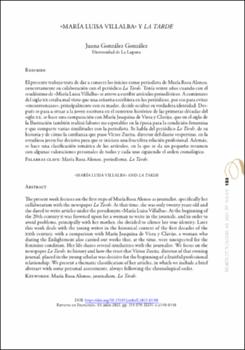«María Luisa Villalba» y La Tarde
Autor
González González, JuanaFecha
2021Resumen
El presente trabajo trata de dar a conocer los inicios como periodista de María Rosa Alonso,
concretamente su colaboración con el periódico La Tarde. Tenía veinte años cuando con el
seudónimo de «María Luisa Villalba»se atreve a escribir artículos periodísticos. A comienzos
del siglo xx estaba mal visto que una señorita escribiera en los periódicos, por eso para evitar
«encontronazos», principalmente con su madre, decide ocultar su verdadera identidad. Des-
pués se pasa a situar a la joven escritora en el contexto histórico de las primeras décadas del
siglo xx, se hace una comparación con María Joaquina de Viera y Clavijo, que en el siglo de
la Ilustración también realizó labores no esperables en la época para la condición femenina
y que comparte varias similitudes con la periodista. Se habla del periódico La Tarde, de su
historia y de cómo la confianza que puso Víctor Zurita, director del diario vespertino, en la
estudiosa joven fue decisiva para que se iniciara una fructífera relación profesional. Además,
se hace una clasificación temática de los artículos, en la que se da un pequeño resumen
con algunas valoraciones personales de todos y cada uno siguiendo el orden cronológico. The present work focuses on the first steps of María Rosa Alonso as journalist, specifically her
collaboration with the newspaper La Tarde. At that time, she was only twenty years old and
she dared to write articles under the pseudonym «María Luisa Villalba». At the beginning of
the 20th century it was frowned upon for a woman to write in the journals, and in order to
avoid problems, principally with her mother, she decided to silence her true identity. Later
this work deals with the young writer in the historical context of the first decades of the
xxth century, with a comparison with María Joaquina de Viera y Clavijo, a woman who
during the Enlightment also carried out works that, at the time, were unexpected for the
feminine condition. Her life shares several similarities with the journalist. We focus on the
newspaper La Tarde, its history and how the trust that Víctor Zurita, director of that evening
journal, placed in the young scholar was decisive for the beginning of a fruitful professional
relationship. We present a thematic classification of her articles, in which we include a brief
abstract with some personal assessments, always following the chronological order.





